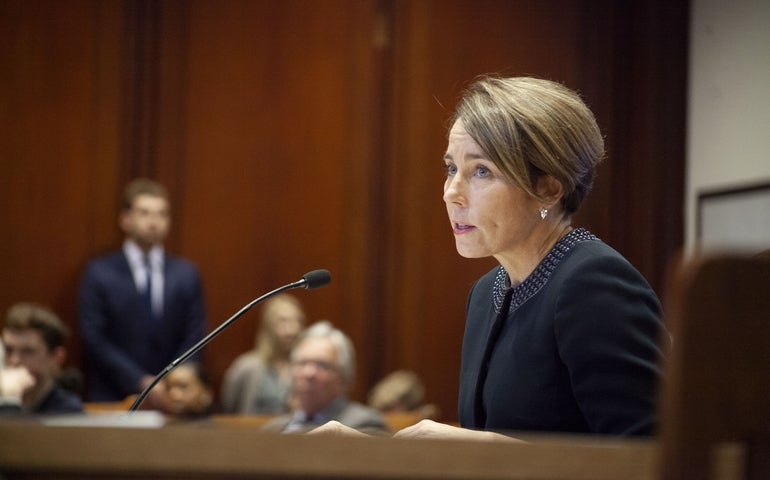Thousands of people prescribed Purdue Pharma opioids like OxyContin will die of overdoses while the company pursues bankruptcy as part of a court settlement with states, Attorney General Maura Healey and the other states that oppose the proposed settlement contend in their latest filing.
Armed with data from the Massachusetts Prescription Monitoring Program, the 24 states and District of Columbia are attempting to get the Connecticut-based company to change how it markets and sells OxyContin, and how it interacts with people prescribed high doses of its drugs, before the company’s bankruptcy process concludes.
More than 800 people filled prescriptions for OxyContin in Massachusetts since Jan. 1, 2009, and have subsequently died of an opioid-related overdose in Massachusetts, according to data from the Department of Public Health. In the first half of 2019, 53 people — or more than two a week — who had been prescribed OxyContin since 2009 died of an opioid overdose in Massachusetts, the filing said.
“Nationwide, it is likely that a dozen Purdue patients die of overdoses every day,” the group of non-consenting states wrote. “Unless effective measures are taken, thousands of Purdue patients will die of overdoses during this case.”
In September, Purdue filed for Chapter 11 bankruptcy protection in New York and announced that it had agreed to a roughly $10 billion settlement with 24 state attorneys general. Healey, who filed the first state lawsuit against individual members of the company’s controlling Sackler family, opposed any settlement that does not require the Sacklers to forfeit some of the profits they counted from the sale of opioids and has formally opposed the bankruptcy petition.
Of the 7,437 people in Massachusetts who have filled prescriptions for 80-milligram OxyContin, the strongest pill Purdue makes, since 2009, about two percent have died of an opioid overdose, the filing said.
“The most recent evidence shows that Purdue’s opioids are dangerous and far too many Purdue patients continue to overdose and die,” Healey said in a statement. “We are calling on Purdue to change its ways now, before more families lose people they love.”
The states suggest nine actions Purdue could take while it is going through bankruptcy. The ideas include providing free doses of the overdose-reversing drug naloxone to people prescribed high levels of OxyContin, stopping the sale of the powerful 80mg variety of OxyContin, asking federal regulators to add warnings or restrictions to the OxyContin label, and retracting its past marketing.
In a statement, Purdue Pharma said the information in the latest filing is misleading and is an attempt of the dissenting states to “substitute their judgment for the scientific experts at the FDA.”
“The ‘Public Health Information’ filed by the dissenting attorneys general is misplaced and misleading. The U.S. Food and Drug Administration (FDA) “not the bankruptcy court” is the appropriate forum, with requisite expertise, to address these public health issues,” the company said. “The supposedly new information cited by the dissenters about the risks of OxyContin is highly misleading. They attribute deaths to OxyContin no matter how many years had passed since a patient had been prescribed OxyContin or what other factors or drugs contributed to their deaths. According to the dissenters, 17 OxyContin patients died from an opioid-related overdose in Massachusetts in 2019. Yet six of these patients received their last OxyContin prescription five or more years ago, and the only two who received prescriptions in 2019 received low doses.”
Under the agreement it reached with 24 states, Purdue Pharma would reorganize itself through the bankruptcy process as a public beneficiary trust managed by those who filed claims against it for its alleged role in the addiction epidemic. About $7 billion of Purdue Pharma’s money, including some in the form of future proceeds from the sale of OxyContin, and a minimum of $3 billion from the personal fortune of the Sackler family, will flow into the new entity. The settlement, according to Purdue, also suggests the “potential for substantial further monetary contributions” from the sales of the Sackler family’s ex-U.S. pharmaceutical businesses.
“This settlement framework avoids wasting hundreds of millions of dollars and years on protracted litigation, and instead will provide billions of dollars and critical resources to communities across the country trying to cope with the opioid crisis,” Steve Miller, chairman of Purdue’s board of directors, said in a statement when the settlement was announced.

